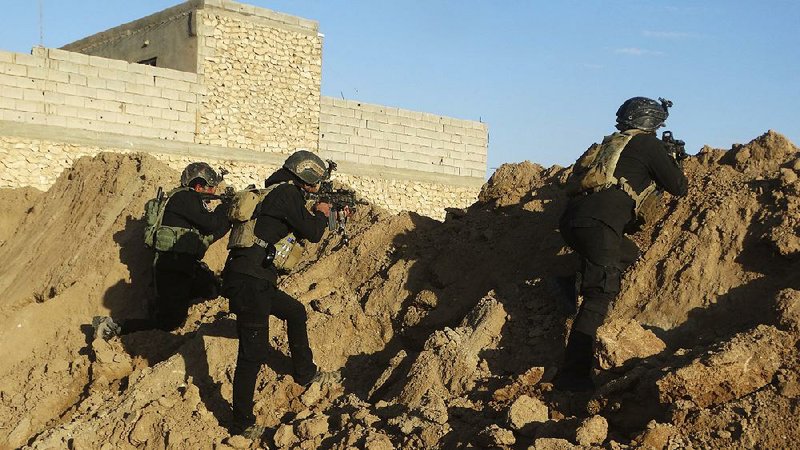BAGHDAD -- After months of sluggish progress, Iraqi troops and militias backed by U.S.-led airstrikes have surrounded the key city of Ramadi and appear poised to begin a new attempt to wrest it from the Islamic State.
RELATED ARTICLES
http://www.arkansas…">More U.S. troops to assail ISIS http://www.arkansas…">Russia absent but still a NATO topic http://www.arkansas…">Russian: Downing muddles Syria talks
The encirclement of Ramadi is a key first step in retaking it, said Interior Ministry spokesman Saad Maan. The Iraqi forces will start clearing the city of Islamic State militants "in the coming days, less than a week," he added.
The battle that is shaping up threatens to turn into a drawn-out siege, with thousands of residents caught in the middle as forces try to wear down the militants who have held the city since May. Western officials and analysts warn that a siege could make the fight even more difficult.
On Monday, the Iraqi military dropped leaflets into the city, telling the remaining residents -- estimated at between 4,000 and 10,000 -- to leave, the strongest signal yet that an assault is imminent.
But residents said Tuesday that the militants have clamped down, setting up checkpoints across the city to monitor civilians' movements and prevent anyone from leaving.
"Loudspeakers from mosques give warnings that civilians are not allowed to leave, and anyone who tries to do so will be either arrested or killed," one resident said, speaking on condition of anonymity out of fear for his safety.
Ramadi, like the rest of Anbar province, is overwhelmingly Sunni Muslim, the minority community that complains of discrimination by the Shiite-led government in Baghdad. Some Sunnis in other parts of Anbar and in northern Iraq welcomed Islamic State rule, at least initially.
Resentment of the extremists has been stronger in Ramadi, but some residents worry about the cost of dislodging the Islamic State.
"Of course, we want this to end," a resident said, referring to Islamic State rule and the government siege. But he said he also fears increased airstrikes and clashes while he and his family are unable to escape.
The Islamic State's capture of Ramadi was a blow to the Iraqi military. The two sides had been battling over it since summer 2014. But in May, the militants unleashed a wave of suicide bombings, and police and troops collapsed and fled.
The city became part of the large swath of territory the Islamic State holds in Iraq, including most of Anbar province and the northern city of Mosul, linked with areas of northern and eastern Syria that the group also controls.
For several months, Iraqi troops and an umbrella group of militias -- mostly Shiites -- have been fighting in Anbar. Although progress was often slow, they regained territory surrounding the city. In recent days, their efforts to retake Ramadi have been boosted by a victory in northern Iraq by Kurdish forces, who recaptured the strategic town of Sinjar.
The most recent estimates from the U.S.-led coalition say there could be as many as 1,000 Islamic State fighters inside Ramadi. Iraqi officials said their forces surrounding the city number several thousand.
"The aim is to cut off all supplies to Daesh," said Brig. Gen. Ahmed al-Bilawi, using an Arabic acronym for the Islamic State. "We are just awaiting the zero hour to attack the center of the city of Ramadi in order to free it."
But a long siege could just allow the Islamic State fighters to dig in more, said retired Lt. Gen. Mark Hertling, who led U.S. forces in Iraq in 2007-08 as they fought to end sectarian warfare.
Iraqi commanders believe Islamic State fighters "will use up ammunition, run out of food and, especially, water," Hertling said. But that will take some time, which the Islamic State can use to carpet the city with homemade bombs, build tunnels to avoid airstrikes and move assets out of the area, he said.
Western military strategy, he added, "is built on taking away the advantages of the defender by keeping him under pressure, attacking vigorously at multiple points, and being more mobile." That requires a level of command, control and training that Iraqi forces don't have, Hertling said.
Gen. Joseph Dunford, chairman of the Joint Chiefs of Staff, said in Washington that the Iraqi forces have been "tightening the noose" around Ramadi, but at a slower pace than the U.S. would like.
"Progress that has been made over the past several weeks, while real, is not necessarily significant," Dunford said in testimony before the House Armed Services Committee.
Information for this article was contributed by Qassim Abdul-Zahra, Sinan Salaheddin and Robert Burns of The Associated Press.
A Section on 12/02/2015

